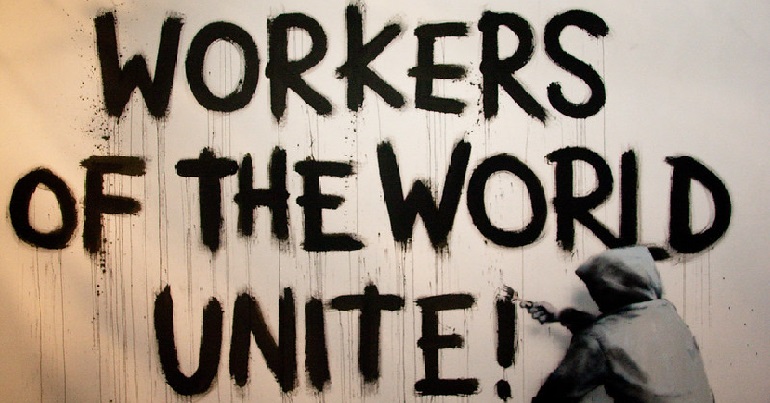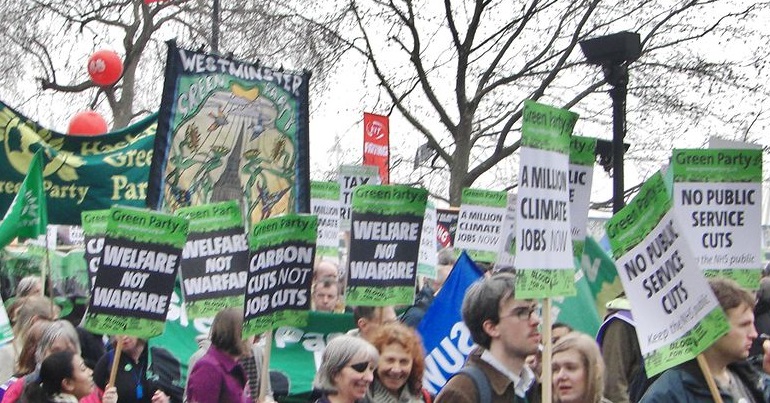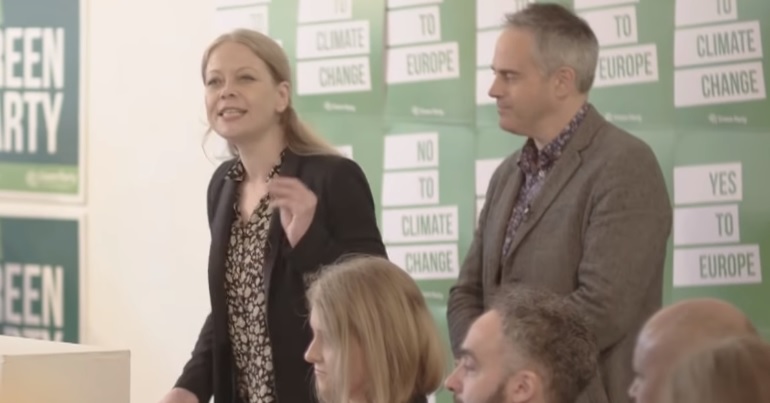Green Parties must embrace class politics

Green Parties have long championed universal provision as a means of avoiding the cruelty, waste, and coercion of means tested systems of welfare provision. Universal Basic Income, for years a fringe idea suppressed and secluded by dominant modes of political thought, is having a moment in the spotlight. In emergencies like that driven by Covid-19, when threats to the common good are felt both more acutely and more broadly, simple and universal measures seem more attractive to more and more people. And as the old structures and practices of political and economic management appear are put on life support, the idea that these things aren’t attainable looks more clownish and silly than ever.
But as obvious as the advantages of universal provision seem to us, we are navigating a world with pre-existing social divisions that appear to complicate our task. It is in this existing world that we have to make our case, build power, and exercise it to win. We can make history, to be sure, but not in conditions of our own choosing. The strategic and campaign decisions we must make are correspondingly many and varied.
I couldn’t hope to address them all here, and so I’ll keep myself to one. One such strategic decision regards our positioning around questions of class. No one – or at least no one serious – would deny that both prosperity and pain are currently structured around hierarchies of class, gender, race, and many other social divisions besides. But there is a live question in Green Parties and movements as to how to navigate these hierarchies in political discourse.
On the one hand, universal provision of goods and services, it could be argued, are most compelling as means to address existing class inequalities. On the other hand, it can be tempting to see universal provision (including flagship Universal Basic Income proposals) as a way to ‘escape’ and organise outside of class categories altogether.
The question as I see it could be posed as follows: does having a clear class politics and positioning ourselves clearly around class relations help, or hinder the struggle for universal provision?
For clarity, I’m identifying classes as social categories reflecting our personal and institutional relationships with the dominant modes of production and exchange, realised in our everyday lives. What follows is my space-limited and unapologetically one-sided strategic case for a Green class politics, that identifies the working class as the key agent of progressive change.
Green politics is hollow without class politics
To build the institutions, politics, and economy needed to provide universal goods, it goes without saying that we need a robust social coalition at our backs. This coalition must not only support social progress at the ballot box. It must also believe in it and be prepared to defend it between elections. After all, the institutions and practices that we must create need people to participate in them enthusiastically and defend them from encroachment by people who currently hold power and stand to lose a great deal from progressive change.
A notable feature of neoliberal capitalism has been its ability to reshape and subsequently constrain the political imaginations of millions. Critic and theorist Mark Fisher called it “capitalist realism“. Margaret Thatcher put it more bluntly, stating that despite the apparent unpopularity of her proposals, “people understand that there is no alternative“. Our task is nothing less than to break these mental chains and, in the radical tradition, make hope possible for people once more.
The coalition we’re looking for must be united by real interests that cut to the very core of our lives under the neoliberal phase of capitalism. It must be able to withstand serious pressures to relent, and resist attempts to drive a wedge between its different members, regardless of their background. It must have little or no stake in the system that has exploited it and continues to use our natural environment as though it were an inexhaustible resource; it must have very good reason to embrace and defend a new social settlement. Not only that, but it must also have the real ability to take collective action by downing tools, withholding rent, and jamming the gears of production and accumulation to leverage its true power.
The best candidate for a coalition this powerful – in fact, the only one that comes close – is an organised and determined working class. Bound together by real interests, working people have a joint stake in overcoming a system that exploits their labour and the environmental basis for their survival. For them, its replacement with something based on people, not profit is to be welcomed. For millions of working people, their stake in preserving the existing political and economic order is illusory. Finally, collective institutions of the working class – such as trade unions, renters’ unions, feminist collectives, grassroots community campaigns, and others – have the real power to break the cycle of production, accumulation, and reproduction as it currently exists and demand something better.
Towards an intersectional Green class politics
Importantly, our class politics must abandon dated, chauvinistic stereotypes about what constitutes the working class. These misguided conceptions hold us back and prevent us from forming a truly formidable force.
This means recognising that identifying ‘working class people’ merely as white industrial labourers is racist, and that the ranks of the global working class are largely black and brown. It means recognising that class divisions intersect with hierarchies of gender, race, and more, and that these identities structure the ways in which injury and exploitation is paid out under capitalism.
It means recognising that the often unwaged work of social reproduction that is ordinarily degraded and undervalued – such as housework, caring, bringing up children, and much more – is real work; those who perform it, largely women, are at the sharp end of exploitation. It means recognising that the unemployed are members of the working class, acutely exploited under capitalism as part of a reserve labour force.
Crucially for Greens, it means recognising that stewardship of environmental systems and resources is vital work in a sustainable society. Capitalism encloses and exploits environmental resources with the same rapacity with which it exploits our labour, our time, and the care work we do in the home. By taking from the socially produced surplus it provides, and refusing the costs of reproducing it, it shifts the cost of reproducing this surplus onto the most marginalised communities. Among them are predominantly indigenous and global south communities who have maintained these same resources for centuries before capitalist enclosure. These people are central to the working class.
Perhaps more controversially, it also means recognising that our relationship with the means of production and exchange are complex, and that under the neoliberal phase of capitalism, millions of young graduates and school leavers, including downwardly-mobile young professionals who don’t enjoy the security of ‘asset-based welfare’ through homeownership their parents came to expect, are natural allies of the working class in this moment.
It is perhaps most important to recognise, to quote a certain political leader, that “there is no alternative” to this coalition; none that can move mountains and shift power in the ways that are required. This is because taking coordinated collective action in this way demands a powerful confluence of shared material interests, experiences, and struggles. Without these powerful bonds – bonds that under the right conditions can unite workers in disdain at their bosses, landlords, and others who dominate their lives – we cannot plausibly hope for our coalition to maintain its integrity for the duration of the fight ahead.
Nothing else comes close, and the way to build this lasting and durable coalition is not in doubt. If we want to build public power to attain universal goods, we need to keep building class consciousness and actively strengthen the bonds I describe.
There is no alternative. The sooner we realise this, the sooner we can help form and influence the only force capable of winning the world we want to see.
Image credit: Jurriaan Persyn – Creative Commons




Good to see THAT debate open up on Bright Green. Not sure how “class” intersects with any hierachies of a multitudes of identities.
Great to see an article like this. I have no doubt that Green Politics is dead in the water without class. Who is bearing the burden of the Covid crisis? The frontline health and care workers, the folk working in the supermarkets and the convenience stores. Who is keeping society going ? The delivery workers, the people who work for Amazon etc. Who are going to lose their jobs: the aircrew and groudcrew who have furloughed for British Airways etc. And does anyone believe that our elders and betters are in it with us? No way! We are not all in it together. I see a huge debate opening up within the Greens between those of us who broadly agree with the above article and those who believe that radical ideas will lose support.
Just wanted to say this is a fantastic article with a great sentiment.
I rarely, if ever, hear words such as “Green politics is hollow without class politics” yet I think this sums up the situation perfectly. Working class unity is going to be essential for protecting our planet.
Really good stuff, I hope this call can be carried forward.
Thanks